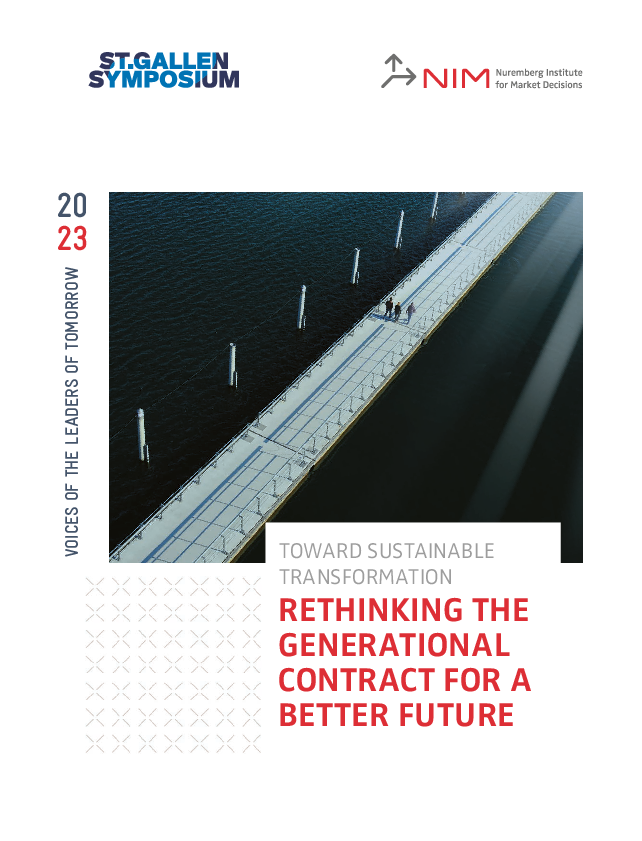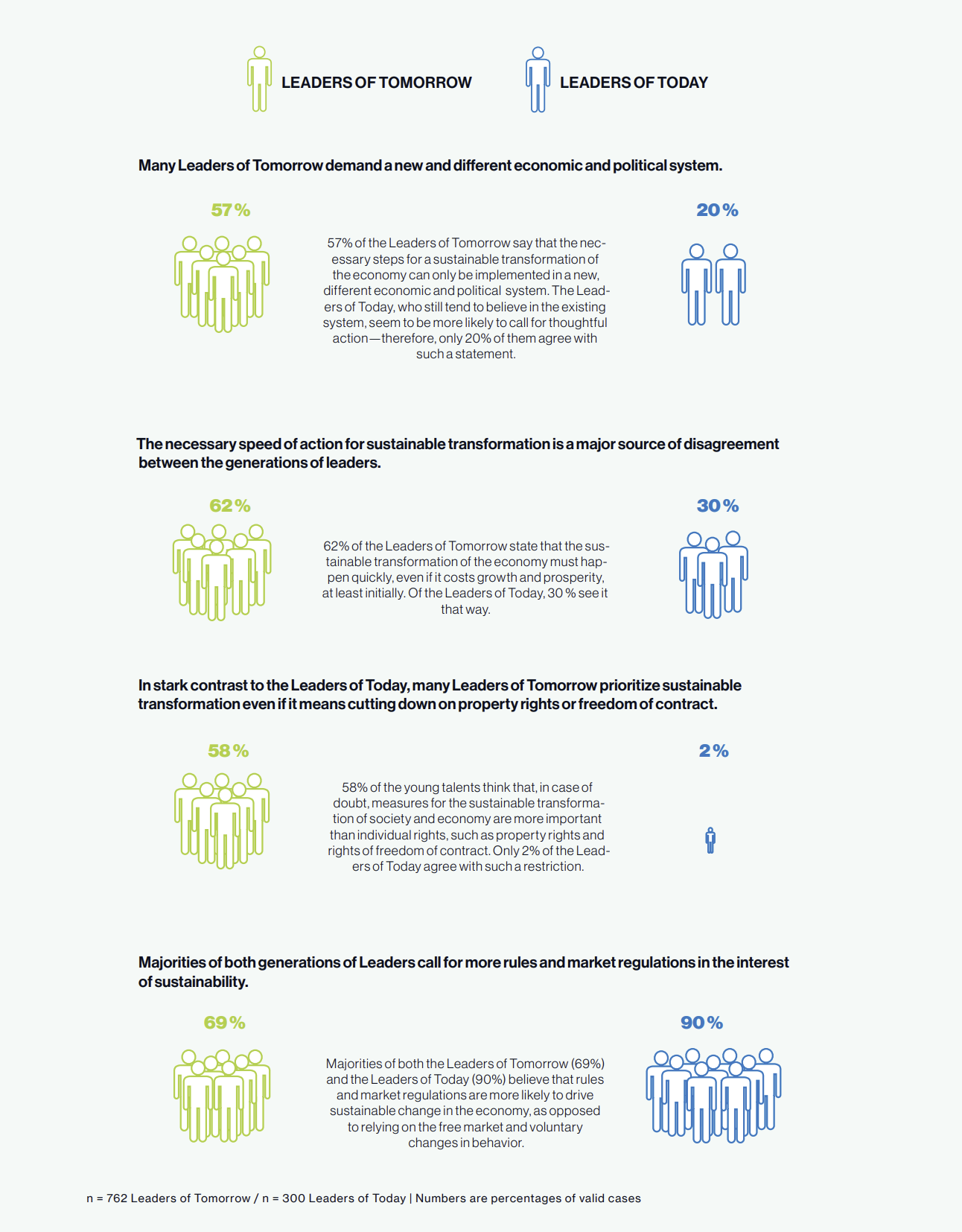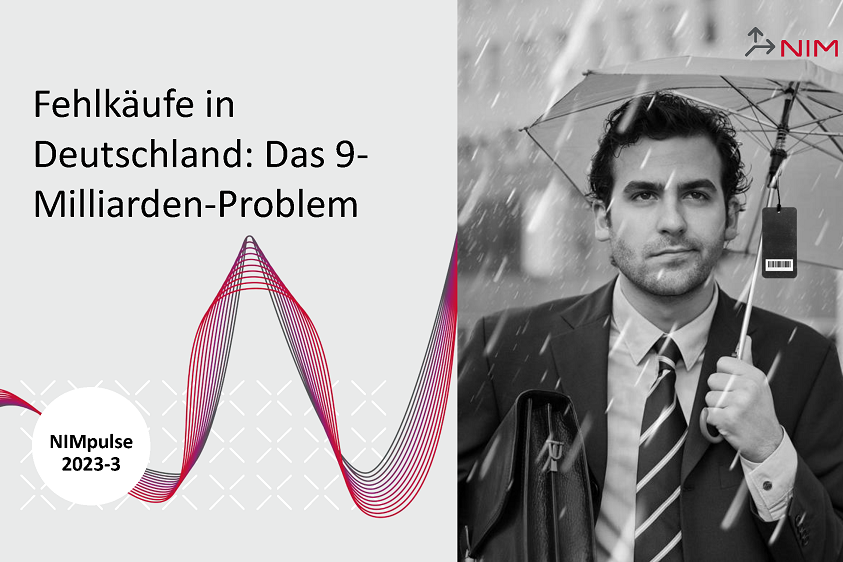Publikationen
 Download
Download
2024
Nina Hesel,
Holger Dietrich,
St. Gallen Symposium
Generation Green: The Radical Pulse of Tomorrow’s Leaders
When it comes to climate action, tomorrow’s leaders are not dutifully following in the footsteps of their predecessors. The latest Voices of the Leaders of Tomorrow (VOLOT) study by the Nuremberg Institute for Market Decisions (NIM) found that the next generation of leaders has a deep—and sometimes radical—commitment to fostering more sustainability. What about today’s leaders? NIM interviewed individuals from both ends of the generational spectrum.
“I believe that there is no direct correlation between growth and happiness,” says Gael, 23, a social entrepreneur from the Ivory Coast. Most of the aspiring leaders of his generation would agree, seeing climate protection as a top priority. The VOLOT study surveyed 762 aspiring leaders up to the age of 35, and 300 senior executives who are 50 years or older and work in the world’s 3,000 top revenue companies.
Interestingly, 62% percent of young leaders prioritize a better climate over growth and prosperity, and almost half of them find that breaking rules or laws is acceptable if it helps the environment. 57% believe that climate protection is only achievable through radical changes—creating a new, different economic and political system.
47 % of the Leaders of Tomorrow agreed that given the global challenges posed by the climate crisis, it is also okay for individuals to defy existing rules and laws in order to accelerate the sustainable transformation of society and the economy.
VOLOT 2023 study by NIM and the St. Gallen Symposium
“To tackle indecisiveness among leaders of today, more radical means could include implementing strict personal accountability measures, such as holding executives legally responsible for environmental damages caused by their companies,” states Petter, 28, a climate tech entrepreneur from Norway. His fellow countryman Halvor, 27, a management consultant and serial entrepreneur, believes that today’s leaders show little commitment to solving the problems arising from the climate crisis.
While they see themselves as having a deep commitment to climate protection, the leaders of tomorrow consider the climate protection measures of today’s business leaders to be too timid: Of the 762 high potentials under the age of 35 surveyed, more than half believe that the older generation is delaying real change and not considering the perspective of younger generations when making decisions.

While Mara, 27, a social entrepreneur from Luxembourg, notes that today’s leaders “still may not fully comprehend the gravity of the climate crisis and the urgency of taking action immediately,” today’s business leaders themselves feel in tune with the views of younger generations. The survey of today’s managers found that 77% of current leaders think that they take climate protection as seriously as the younger generation does. 85% felt that they were addressing climate change with the utmost urgency.
The common ground: Strong climate protection policies are needed
Despite the differences and conflicts between the generations, there is also consensus. One notable finding of the VOLOT study 2023 is the shared belief that rules, laws, and market regulation are more likely to drive the transition to greater sustainability than voluntary behavior change and the free market. 69% of young leaders and as many as 90% of older business leaders share this view.
This common ground provides an important basis for intergenerational dialogue and cooperation. It shows that, despite the existing conflicts, there is a shared understanding of the need for structural changes and regulatory measures. This mutual perspective can serve as a starting point for developing joint strategies and actions to address climate change and promote sustainable transformation. The challenge now is to translate this agreement into concrete measures and strategies. Companies must nurture a cross-generational dialogue to see different perspectives and concerns while finding shared solutions. They must also be open to change and willing to rethink and adapt existing systems and processes. Only then can a positive and lasting impact be made.
Autorinnen und Autoren
- Dr. Fabian Buder, Head of Future & Trends Research, NIM, fabian.buder@nim.org
- Nina Hesel, Senior Researcher, NIM, nina.hesel@nim.org
- Holger Dietrich, Senior Researcher, NIM, holger.dietrich@nim.org
- St. Gallen Symposium
Kontakt






